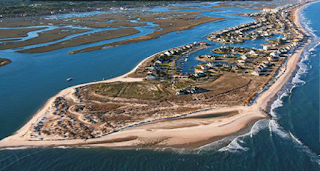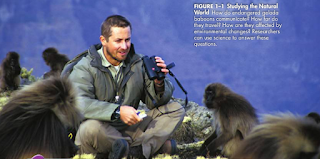Ch 1
The Science of Biology
1.1 What is Science
Science is not a collection of never-changing "facts". Science is always changing. Improving technology causes new discoveries which sometimes prove or disprove current beliefs or theories.
Science is always changing.
Science is an organized way of gathering and analyzing evidence about the natural world.
Science is a process, not a thing
The following make science different from other human endeavors:
1. Science only deals with the natural world. It does not deal with "supernatural" phenomena of any kind.
2. Scientists collect and organize info in an orderly way, looking for patterns and connections among events.
3. Scientists propose evidence that is based on evidence, not belief.
What are the goals of science?
1. To provide natural explanations for events in the natural world.
2. To use those explanations to understand patterns in nature and make used predictions about natural events.
Almost every major scientific discovery raises more questions than it answers!
Science rarely proves anything in absolute terms!
Curiosity
Skepticism
Open-Mindedness
Creativity
A curious research may look as a salt marsh and ask, "What's that plant? Why is it growing here?"
Good scientists are skeptics, which means that they question existing ideas and hypotheses, and refuse to accept explanations without evidence.
Scientists must remain open-minded, meaning that they are willing to accept different ideas that may not agree with their hypothesis.
Researchers also need to think creatively to design experiments that yield accurate data.
How do we Explore and Discover?
Once research has been published, it enters the dynamic marketplace of scientific ideas.
Lesson 1.3
For Powerpoint 1.3 Click link below
https://docs.google.com/presentation/d/1DViLcpV_pweUmJc9XgMiLGXoLepfb1DByysNYGD1lzE/edit?usp=sharing
2. Scientists collect and organize info in an orderly way, looking for patterns and connections among events.
3. Scientists propose evidence that is based on evidence, not belief.
What are the goals of science?
1. To provide natural explanations for events in the natural world.
2. To use those explanations to understand patterns in nature and make used predictions about natural events.
Almost every major scientific discovery raises more questions than it answers!
Science rarely proves anything in absolute terms!
Scientific Methodology: The Heart of Science
Scientific methodology involves:
Observing and Asking Questions
Making Inferences
Forming a Hypotheses
Conducting Controlled Experiments
Collecting and Analyzing Data
Drawing Conclusions
Reporting Results
Observation: the act of noticing and describing events or processes in a careful, orderly way.
Inference: a logical interpretation based on what scientists already know.
Hypothesis: a scientific explanation for a set of observations that can be tested in ways that support or reject it.
Controlled Experiment: testing a hypothesis by designing and experiment that keeps track of all factors that can change. Only one factor is changed from the control group in a controlled experiment.
Independent Variable: the variable that is deliberately changed in an experiment.
Dependent Variable: the variable that is observed and that changes in response to the independent variable.
Control Group: exposed to the same conditions as the experimental group except for one independent variable. Nothing changes in the control group.
Experimental Group: the group in which one independent variable is changed from the control group.
Data: detailed records of experimental observations, gathered information.
Quantitative data: numbers obtained by counting or measuring.
Qualitative data: descriptive words involving characteristics that cannot usually be counted.
Research Tools
Scientists tools range from simple measuring devices to calculator, computers, charts and graphs.
Sources of Error
Experimental and control groups should be quite large because there is always variation among individuals. The larger the sample size, the more reliably researchers can analyze that variation.
Researchers must use accurate tools to measure. Data analysis and sample size must be chosen carefully.
Drawing Conclusions
Hypotheses are often not fully supported or refuted by one set of experiments. Often, original hypotheses are reevaluated and revised.
** Sometimes ethics prevents certain types of experiments - especially on human subjects.
To view Lesson 1.1 Powerpoint click below:
https://docs.google.com/presentation/d/1uEXG68UuzfTlx96ycnAicQVd0Xa0fydRh0qUiixUmqM/edit?usp=sharing
1.2 Science in Context
Where Do Ideas Come From: Exploration and Discovery
What scientific attitudes help generate new ideas?
Curiosity
Skepticism
Open-Mindedness
Creativity
A curious research may look as a salt marsh and ask, "What's that plant? Why is it growing here?"
Good scientists are skeptics, which means that they question existing ideas and hypotheses, and refuse to accept explanations without evidence.
Scientists must remain open-minded, meaning that they are willing to accept different ideas that may not agree with their hypothesis.
Researchers also need to think creatively to design experiments that yield accurate data.
How do we Explore and Discover?
Sometimes, ideas for scientific investigations arise from practical problems.
Sometimes, discoveries in one field of science may lead to new technologies, and new technologies can lead to new discoveries.
 |
| Ideas from Practical Problems: People living on a strip of land like this one in Murrells Inlet, South Carolina, may face flooding and other problems. |
Communicating Results: Reviewing and Sharing Ideas
 |
| Communication is an important part of science. Scientists review and evaluate one another's work to ensure accuracy. Results from one study may lead to new ideas and further studies. |
Why is peer review important?
Communication and sharing of ideas are vital to modern science.
In peer review, scientific papers are reviewed by anonymous, independent experts. Publishing peer-reviewed articles in scientific journals allows researchers to share ideas and to test and evaluate each other's work. Scientific articles are like high-powered versions of your high school lab reports. They contain details about experimental conditions, controls, data, analysis, and conclusions.
Sharing Knowledge and New Ideas
Once research has been published, it enters the dynamic marketplace of scientific ideas.
How do new findings fit into existing scientific understanding? Perhaps they spark new questions... like... If growth of salt marsh grass is found to be limited by available nitrogen, then is the growth of other plants in the same habitat also limited by nitrogen?
Scientific Theories
A Scientific Theory is supported by evidence from many scientific studies. When several related hypotheses are supported, researchers may be inspired to propose a scientific theory that ties those hypotheses together.
The word theory is used in science and in everyday life.
In every day life, we use the word to mean we have a "hunch". This is more like a hypothesis in science.
In science, a theory applies to a well-tested explanation that unifies a broad range of observations and hypotheses and that enables scientists to make accurate predictions about new situations.
A useful theory that has been thoroughly tested and supported by many lines of evidence may become the dominant view among the majority of scientists, but no theory is considered absolute truth.
The word theory is used in science and in everyday life.
In every day life, we use the word to mean we have a "hunch". This is more like a hypothesis in science.
In science, a theory applies to a well-tested explanation that unifies a broad range of observations and hypotheses and that enables scientists to make accurate predictions about new situations.
A useful theory that has been thoroughly tested and supported by many lines of evidence may become the dominant view among the majority of scientists, but no theory is considered absolute truth.
Science and Society
When scientists explain "why"something happens, their explanation involves only natural phenomena. Pure science does not include ethical or moral viewpoints. Science cannot answer questions about why life exists or what the meaning of life is.
Science can tell us how technology and scientific technology and knowledge can be applied but not whether is should be applied in particular ways.
Using science involves understanding its context in society and its limitations.
Science can tell us how technology and scientific technology and knowledge can be applied but not whether is should be applied in particular ways.
Using science involves understanding its context in society and its limitations.
 |
| Science both influences society and is influenced by society. |
Avoiding Bias
Bias is a particular preference or point of view that is personal, rather than scientific.
Science aims to be objective, but scientists are human, too. They have likes, dislikes, and occasional biases. Scientific data can be misinterpreted by scientists who want to prove a particular point.
Science will keep changing as long as humans keep wondering about nature.
Understanding biology will help you realize that we humans can predict the consequences of our actions and take an active role in directing our future and that of our planet.
To view Lesson 1.1 Powerpoint click below:
https://docs.google.com/presentation/d/1qnyP9UoaPoBahSzVK6BFlomZ9Z0BnnKfynsEgoHQL4c/edit?usp=sharing
Lesson 1.3
Studying Life
Biology - the study of life
No single characteristic is enough to describe a living thing. Some nonliving things share one or more traits with organisms.
The Characteristics of Living Things
For Powerpoint 1.3 Click link below
https://docs.google.com/presentation/d/1DViLcpV_pweUmJc9XgMiLGXoLepfb1DByysNYGD1lzE/edit?usp=sharing























